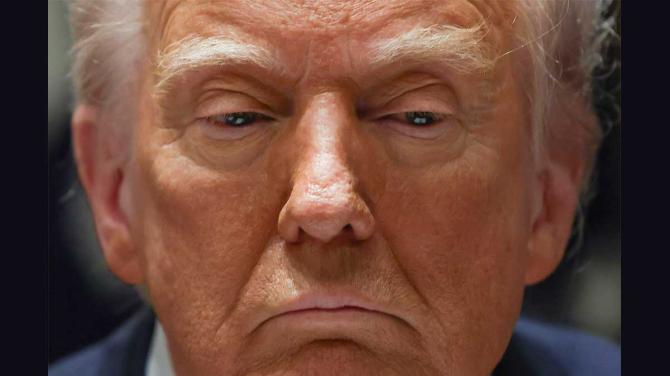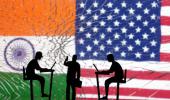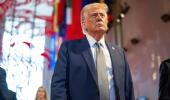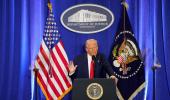'As negotiations continue, the path forward demands not only diplomatic skill, but also vigilance against legal asymmetries embedded in America's trade playbook.'

Photograph: Evelyn Hockstein/Reuters
US President Donald Trump is weighing a two-step approach to implementing his new tariff regime, potentially invoking rarely used emergency powers to impose immediate duties on imports while formal investigations into trading partners unfold, the Financial Times newspaper reported.
While Trump has long railed against foreign trade practices, some administration officials see tariffs not just as a negotiating tool but also as a way to bolster revenue for planned tax cuts, the report said, citing sources.
Officials, the FT reported, are scouring legal avenues to expedite tariff implementation, with Section 301 investigations, the International Emergency Economic Powers Act, and Section 338 of the 1930 Tariff Act among the options under review.
These measures could allow the administration to slap duties of up to 50 per cent on certain imports.
Trump may also revive a national security probe into the auto industry, a move that could trigger tariffs on vehicle imports as soon as April 2, the report said, citing lawyers and sources familiar with the plan.
Another, albeit less likely, alternative is Section 122 of the Trade Act of 1974, which permits temporary tariffs of up to 15 per cent for 150 days.
The administration has yet to finalise its approach, with the scope and purpose of the tariffs still under discussion.
Soon after taking office, Trump vowed to unveil new tariffs on April 2, branding the date 'liberation day'.
The pledge set off a wave of diplomatic efforts, with foreign governments lobbying senior US officials for exemptions.
He initially imposed a blanket 25 per cent tariff on steel and aluminium imports, extending duties to a range of products made with the metals.
He later announced tariffs on allies, including Mexico and Canada, only to reverse course following intense pressure from businesses.
On Monday, Trump reaffirmed his intent to impose 'substantial' tariffs on trading partners, though he signalled that some nations might secure exemptions.
'They have charged us so much that I am embarrassed to charge them what they have charged us, but it will be substantial,' he said.
Hours later, he unveiled a new 25% tariff targeting countries purchasing oil and gas from Venezuela, including India and China.
'Venezuela has been very hostile to the United States and the freedoms we espouse,' Trump wrote on Truth Social.
'Any country that buys oil and/or gas from Venezuela will be forced to pay a tariff of 25% on any trade they do with our country.'
A presidential order signed Monday stipulates that the tariff will take effect as early as April 2 and will apply broadly to both direct and indirect buyers of Venezuelan crude.
How Should India Respond to Trump’s Tariff Threats?
Shreya Nandi, Business Standard
India must remain focused on negotiating only industrial goods tariffs during the talks with Assistant US Trade Representative Brendan Lynch this week, Delhi-based think tank Global Trade Research Institute said on Tuesday.
Lynch, along with a team of US government officials, is in India for a five-day visit, starting March 25 for meetings with the Indian side, as part of the ongoing bilateral trade discussions between the two countries.
The discussions will hammer out the details of the proposed bilateral trade agreement (BTA), with the aim to finalise the contours of the deal.
Both sides hope to finalise the first tranche of the agreement by the fall of 2025.
It recommended that India should eliminate tariffs on 90 per cent of industrial tariff lines, if the US does the same. This strategy would cover over 90 per cent of India-US bilateral merchandise trade.
GTRI further recommended that India should not engage in discussions around intellectual property, digital trade, agricultural tariffs or subsidies, or government procurement.
That apart, talks about easing regulations for US giants like Tesla, Starlink, Amazon, and American pharma firms raise serious concerns around national security, IPR, and the long-term impact on Indian businesses, it stated.
Last month, India tried to address US President Donald Trump's concerns by cutting basic customs duties on a bunch of items in its Union Budget, as well as on bourbon whiskey before Prime Minister Narendra Modi's meeting with Trump.
'India's recent unilateral reduction of tariffs on US products like whiskey and motorcycles has gone unacknowledged by the US side,' GTRI said.
In another report, GTRI said that India must be cautious while negotiating the proposed BTA with the US since the absence of 'Fast Track Trade Authority' (FTTA) in America makes any pact vulnerable to Congressional changes.
FTTA is a special power that the US Congress gives to the president to help speed up and simplify trade negotiations with other countries. However, the US currently lacks FTTA.
'In addition, the US uses a one-sided certification process pressurising the partner countries after a trade deal is signed. These two factors create serious uncertainty.
'They can allow the US to change the deal later or demand more than what was originally agreed,' the GTRI report said.
It also said that the absence of FTTA exposes any finalised agreement to unpredictable legislative intervention in Washington.
'As negotiations continue, the path forward demands not only diplomatic skill, but also vigilance against legal asymmetries embedded in America's trade playbook.
'Without Fast Track Authority in place and with the precedent of post-agreement certification allowing the US to impose additional demands, the risk of asymmetric obligations is real,' it said.
Feature Presentation: Ashish Narsale/Rediff.com













 © 2025
© 2025